Stephen Snyder's Blog, page 4
June 17, 2018
How to Find a Sex Therapist
May 28, 2018
Sex Tips for Married Lovers
Why Most Sex Tips Don’t Work
. Sex tips these days tend to be long on technique — but short on feelings. Maybe that explains why so few couples in my sex therapy practice seem to come in with any idea what good sex is supposed to be all about. We’re the most sexually over-exposed society in history. Pornography is everywhere. We know the names for sex acts our grandparents never knew existed. But are couples today any more satisfied in bed? I doubt it. One study from the Kinsey Institute found that nearly a quarter of adult American women in heterosexual relationships were markedly distressed about their sex lives. All the sex tips out there don’t seem to be healing us where it counts. Maybe that’s because they’re all about technique, and rarely about feelings. Emotions are far and away the most important part of sex. But few couples give much thought to their emotions when making love. As a sex therapist—someone who gives sex tips and relationship advice for a living—I’ve searched for a long time for a book to recommend to my patients that would help them learn about erotic feelings. Finally, after years of fruitless searching, I finally decided to write it myself. Over the years, I shared drafts of many of the chapters with hundreds of individuals and couples who consulted me for sexual concerns. Their feedback helped me shape my methods and ideas. As I developed the book over the years, I noticed patients starting to get better, faster. That’s when I knew I was on to something good. I was pleased to be able to sell the book at auction to St Martin’s Press / MacMillan in an extremely competitive New York publishing market — and to work with some of the finest book professionals in the business. And now it gives me great pleasure to share the book with you: 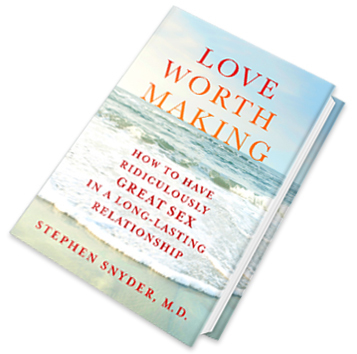 Love Worth Making: How to Have Ridiculously Great Sex in a Long-Lasting Relationship. It’s in many ways a contrarian book, since it contains very little about sex technique, science, or novelties like three-somes and kink. Instead, the book focuses like a laser beam on sexual emotions: what you actually feel, or don’t, when you’re having sex.
Love Worth Making: How to Have Ridiculously Great Sex in a Long-Lasting Relationship. It’s in many ways a contrarian book, since it contains very little about sex technique, science, or novelties like three-somes and kink. Instead, the book focuses like a laser beam on sexual emotions: what you actually feel, or don’t, when you’re having sex.
Here’s one example of the book’s approach:
Beyond Hardness and Wetness
Masters and Johnson spent decades studying sexual response, but their observations were limited to the physical body: heart rate, muscle tone, lubrication, and hardness. Hardness and wetness will only get you so far. You can be perfectly hard or wet, and still have very boring sex. Here’s what I tell patients in my office to look for, as signs that you’re genuinely emotionally aroused— (Passages in italics below are from Chapter 1 of Love Worth Making). 1. You lose a fair number of IQ points. If someone gave you an IQ test during peak arousal, you wouldn’t do too well on it. The tester might have a hard time getting you to pay attention to the questions. Good sex definitely makes you dumber. And great sex can make you downright stupid. When you’re aroused, sex grabs your attention. You stop thinking about bills, worries, responsibilities—your entire portfolio of ordinary concerns. Your time sense may get a little messed up. (Sexually aroused people tend to arrive late to meetings). 2. You become somewhat more childish. Sexual excitement puts you into a more primitive and selfish state of mind. It makes you less patient, less forgiving. You don’t tolerate frustration very well. You become somewhat immature. (OK, sometimes a lot immature!) If the phone rings during lovemaking, you don’t care who’s calling, or what they want. You may feel very close to your partner, but it’s a selfish kind of closeness. You’re not really interested in listening to the details of how their day went. You just want them to give you their complete attention, and to tell you how wonderful you are. 3. You feel absolutely wonderful about yourself. Arousal feels special. Validating. Good sex makes us feel good about ourselves. That’s how we know it’s good sex. With good lovemaking, we have a feeling of “Yes, that’s me. Here I am. You found me.” We feel in touch with our deepest, most authentic selves. It’s a grateful feeling. ‘Yes, you found me. The me of me. Thank you for finding me. Thank you for bringing me home to where I really live.’ Pay attention to your emotions—and they’ll reward you many times over. That’s the best sex tip I know. Now go practice! 
Order Your Copy Today
Love Worth Making is available from any of the following online booksellers . . .




 .
. The post Sex Tips for Married Lovers appeared first on Stephen Snyder MD.
The One Sex Tip You Need for a Long-Lasting Relationship
Sex tips these days tend to be long on technique, but short on feelings. Maybe that explains why so few couples in my sex therapy practice seem to come in with any idea what good sex is supposed to be all about.
In this article, I’ll introduce you to my new self-help sex book, which is all about feelings.
But first, let me tell you a story . . .
Your Wife Is Not a Lawnmower
“Tell me about foreplay,” I say to the next couple in my office. “What kind of foreplay do the two of you enjoy the most?”
“Well, we kiss,” she says. “Then I touch him, and he touches me.”
She’s obviously speaking in some kind of secret code here. But you get the picture, right? She strokes his penis, and then he does something to her vulva with his hands.
Is this a good idea?
Well, that depends. If this couple is riding a wave of ecstasy fueled by erotic touch, then sure. But in that case, chances are they wouldn’t be sitting in my office. More likely, they’re just trying to get the job done—to get him hard and her wet, so they can have sex.
How many couples do it this way when they first fall in love? Not many. When passion is high, no one needs friction to get excited. Hardness and wetness just happen as effortlessly as the blooming of a flower.
That’s the way it’s supposed to go. The sexual self saying yes, in the only language it knows. Trying to convert a “no” to a “yes” by friction alone is like trying to convince a child he likes broccoli.
Forget it. It’s not going to work. Friction may get you sex, but never good sex.
As I sit with this couple, I can’t help recalling a scene from my suburban childhood—watching one of the neighborhood dads try to start up his gas lawn mower. You had to pull the cord just right for the engine to start, and this took practice and skill.
I live in Manhattan now where we don’t have lawns. But the image is still stuck in my head—the mower, the cord, and the look of frustration on the face of the guy hoping to start the thing up.
I wonder whether this couple is old enough to have ever seen a gas mower.
“Look,” I say to him. “Your wife is not a lawnmower. It’s not just a question of pulling the cord right.”
They both laugh.
“But how do I get her wet?” He asks.
“Simple. You don’t.” He looks at me with curiosity.
“It’s not your job to get her wet,” I say. “Just enjoy your own excitement, and let her enjoy hers.”
“That doesn’t sound very romantic.”
“It’s actually much more romantic, if you do it right. And something even more important.”
“What’s that?” he asks.
“It’s more erotic.”
————
Sex Tips That Really Make a Difference
We’re the most sexually over-exposed society in human history. Pornography is everywhere. We know the names for sex acts our grandparents never knew existed. And even kids in middle school know that if an erection lasts more than four hours you should call your doctor.
But are couples today any more satisfied in bed?
I doubt it. One study from the Kinsey Institute found that nearly a quarter of adult American women in heterosexual relationships were markedly distressed about their sex lives.
All the sex tips out there don’t seem to be healing us where it counts. Maybe that’s because they’re all about technique, and rarely about feelings.
Emotions are far and away the most important part of sex. But few couples give much thought to their emotions while making love.
As a sex therapist—someone who gives sex tips and relationship advice for a living—I’ve searched for a long time for a book to recommend to my patients that would help them learn about erotic feelings. Finally, after years of fruitless searching, I finally decided to write it myself.
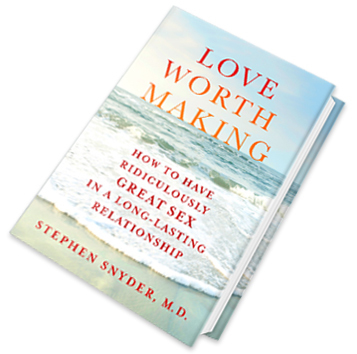
The book launched the day before Valentine’s Day 2018: Love Worth Making: How to Have Ridiculously Great Sex in a Long-Lasting Relationship.
It’s in many ways a contrarian book. Contrary to most collections of sex tips today, it contains very little about sex technique, sexual science, or sexual novelties like three-somes and kink. Instead, the book focuses like a laser beam on sexual emotions: what you actually feel, or don’t, when you’re having sex.
————
The Best Sex Tip of All
Masters and Johnson spent decades studying sexual response, but their observations were limited to the physical body: heart rate, muscle tone, lubrication, and hardness.
Hardness and wetness will only get you so far. You can be perfectly hard or wet, but still be having very boring sex.
Here’s what I tell patients in my office to look for, as signs that you’re genuinely emotionally aroused—
(Passages in italics below are from Chapter 1 of Love Worth Making).
1. You lose a fair number of IQ points. “If someone gave you an IQ test during peak arousal, you wouldn’t do too well on it. The tester might have a hard time getting you to pay attention to the questions. Good sex definitely makes you dumber. And great sex can make you downright stupid. When you’re aroused, sex grabs your attention. You stop thinking about bills, worries, responsibilities—your entire portfolio of ordinary concerns. Your time sense may get a little messed up. (Sexually aroused people tend to arrive late to meetings).”
2. You become somewhat more childish. “Sexual excitement puts you into a more primitive and selfish state of mind. It makes you less patient, less forgiving. You don’t tolerate frustration very well. You become somewhat immature. (OK, sometimes a lot immature!) If the phone rings during lovemaking, you don’t care who’s calling, or what they want. You may feel very close to your partner, but it’s a selfish kind of closeness. You’re not really interested in listening to the details of how their day went. You just want them to give you their complete attention, and to tell you how wonderful you are.”
3. You feel absolutely wonderful about yourself. “Arousal feels special. Validating. Good sex makes us feel good about ourselves. That’s how we know it’s good sex. With good lovemaking, we have a feeling of “Yes, that’s me. Here I am. You found me.” We feel in touch with our deepest, most authentic selves. It’s a grateful feeling. ‘Yes, you found me. The me of me. Thank you for finding me. Thank you for bringing me home to where I really live.’”
Pay attention to those three elements, cultivate experiences with your partner that permit you to experience them, and you’ll be on your way to much better sex.
That’s the best sex tip I have for you today.

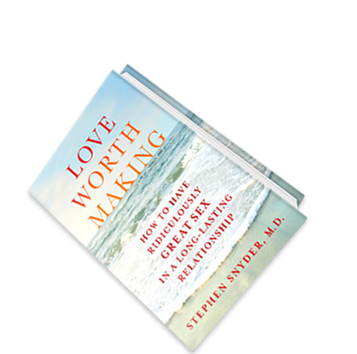
Order your copy today!
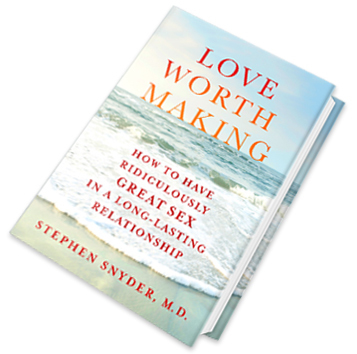
Coming Soon . . .
Stay tuned for future posts in the weeks ahead on how understanding sexual feelings can help or heal your relationship. Here are some previews:
Sex Advice for Women,
And the Men Who Love Them
We’ll review new research from my colleagues Marta Meana and Evan Fertel at the University of Nevada, Las Vegas on what’s called “Erotic Self-Focus” (Chapter 7 in the book)—and how to make it work for you!
Sex Advice for Men,
And for Women Who Want More From Them
We’ll discuss the most common reasons men go missing in bed. Some of them might surprise you. It’s all in Chapter 11.
Sex Advice for Long-Term Committed Couples
Sooner or later, desire takes a hit in most long-term relationships. Most sex advice focuses on “re-igniting the spark” by re-introducing some variety of novelty and adventure. But novelty and adventure tend to wear thin after awhile. In Chapter 15, I’ll show you a better way.
Adapted from LOVE WORTH MAKING by Stephen Snyder, M.D. Copyright © 2018 by the author and reprinted with permission of St. Martin’s Press, LLC.

Order your copy today!

The post The One Sex Tip You Need for a Long-Lasting Relationship appeared first on Stephen Snyder MD.
Sex Tips for Committed Couples: LOVE WORTH MAKING
Sex advice these days tends to be long on technique, but short on feelings. Maybe that explains why so few couples in my sex therapy practice seem to come in with any idea what good sex is supposed to be all about.
In this article, I’ll introduce you to my new self-help sex book, which is all about feelings.
But first, let me tell you a story . . .
Your Wife Is Not a Lawnmower
“Tell me about foreplay,” I say to the next couple in my office. “What kind of foreplay do the two of you enjoy the most?”
“Well, we kiss,” she says. “Then I touch him, and he touches me.”
She’s obviously speaking in some kind of secret code here. But you get the picture, right? She strokes his penis, and then he does something to her vulva with his hands.
Is this a good idea?
Well, that depends. If this couple is riding a wave of ecstasy fueled by erotic touch, then sure. But in that case, chances are they wouldn’t be sitting in my office. More likely, they’re just trying to get the job done—to get him hard and her wet, so they can have sex.
How many couples do it this way when they first fall in love? Not many. When passion is high, no one needs friction to get excited. Hardness and wetness just happen as effortlessly as the blooming of a flower.
That’s the way it’s supposed to go. The sexual self saying yes, in the only language it knows. Trying to convert a “no” to a “yes” by friction alone is like trying to convince a child he likes broccoli.
Forget it. It’s not going to work. Friction may get you sex, but never good sex.
As I sit with this couple, I can’t help recalling a scene from my suburban childhood—watching one of the neighborhood dads try to start up his gas lawn mower. You had to pull the cord just right for the engine to start, and this took practice and skill.
I live in Manhattan now where we don’t have lawns. But the image is still stuck in my head—the mower, the cord, and the look of frustration on the face of the guy hoping to start the thing up.
I wonder whether this couple is old enough to have ever seen a gas mower.
“Look,” I say to him. “Your wife is not a lawnmower. It’s not just a question of pulling the cord right.”
They both laugh.
“But how do I get her wet?” He asks.
“Simple. You don’t.” He looks at me with curiosity.
“It’s not your job to get her wet,” I say. “Just enjoy your own excitement, and let her enjoy hers.”
“That doesn’t sound very romantic.”
“It’s actually much more romantic, if you do it right. And something even more important.”
“What’s that?” he asks.
“It’s more erotic.”
————
The Heart of Lovemaking
We’re the most sexually over-exposed society in human history. Pornography is everywhere. We know the names for sex acts our grandparents never knew existed. And even kids in middle school know that if an erection lasts more than four hours you should call your doctor. But are couples today any more satisfied in bed?
I doubt it. One study from the Kinsey Institute found that nearly a quarter of adult American women in heterosexual relationships were markedly distressed about their sex lives.
Emotions are far and away the most important part of sex. But few couples give much thought to their emotions while making love.
As a sex therapist—someone who gives sex advice for a living—I’ve searched for a long time for a book to recommend to my patients that would help them learn about erotic feelings. Finally, after years of fruitless searching, I finally decided to write it myself.
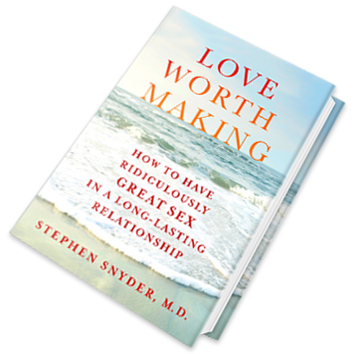
The book launched the day before Valentine’s Day 2018: Love Worth Making: How to Have Ridiculously Great Sex in a Long-Lasting Relationship.
It’s in many ways a contrarian book. Contrary to most sex advice today, it contains very little about sex technique, sexual science, or sexual novelties like three-somes and kink. Instead, the book focuses like a laser beam on sexual emotions: what you actually feel, or don’t, when you’re having sex.
————
How to Recognize Genuine Arousal
Masters and Johnson spent decades studying sexual response, but their observations were limited to the physical body: heart rate, muscle tone, lubrication, and hardness.
Hardness and wetness will only get you so far. You can be perfectly hard or wet, but still be having very boring sex.
Here’s what I tell patients in my office to look for, as signs that you’re genuinely emotionally aroused—
(Passages in italics below are from Chapter 1 of Love Worth Making).
1. You lose a fair number of IQ points. “If someone gave you an IQ test during peak arousal, you wouldn’t do too well on it. The tester might have a hard time getting you to pay attention to the questions. Good sex definitely makes you dumber. And great sex can make you downright stupid. When you’re aroused, sex grabs your attention. You stop thinking about bills, worries, responsibilities—your entire portfolio of ordinary concerns. Your time sense may get a little messed up. (Sexually aroused people tend to arrive late to meetings).”
2. You become somewhat more childish. “Sexual excitement puts you into a more primitive and selfish state of mind. It makes you less patient, less forgiving. You don’t tolerate frustration very well. You become somewhat immature. (OK, sometimes a lot immature!) If the phone rings during lovemaking, you don’t care who’s calling, or what they want. You may feel very close to your partner, but it’s a selfish kind of closeness. You’re not really interested in listening to the details of how their day went. You just want them to give you their complete attention, and to tell you how wonderful you are.”
3. You feel absolutely wonderful about yourself. “Arousal feels special. Validating. Good sex makes us feel good about ourselves. That’s how we know it’s good sex. With good lovemaking, we have a feeling of “Yes, that’s me. Here I am. You found me.” We feel in touch with our deepest, most authentic selves. It’s a grateful feeling. ‘Yes, you found me. The me of me. Thank you for finding me. Thank you for bringing me home to where I really live.’”
Pay attention to those three elements, cultivate experiences with your partner that permit you to experience them, and you’ll be on your way to much better sex!


Order your copy today!

Coming Soon . . .
Stay tuned for future posts in the weeks ahead on how understanding sexual feelings can help or heal your relationship. Here are some previews:
Sex Advice for Women,
And the Men Who Love Them
We’ll review new research from my colleagues Marta Meana and Evan Fertel at the University of Nevada, Las Vegas on what’s called “Erotic Self-Focus” (Chapter 7 in the book)—and how to make it work for you!
Sex Advice for Men,
And for Women Who Want More From Them
We’ll discuss the most common reasons men go missing in bed. Some of them might surprise you. It’s all in Chapter 11.
Sex Advice for Long-Term Committed Couples
Sooner or later, desire takes a hit in most long-term relationships. Most sex advice focuses on “re-igniting the spark” by re-introducing some variety of novelty and adventure. But novelty and adventure tend to wear thin after awhile. In Chapter 15, I’ll show you a better way.
Adapted from LOVE WORTH MAKING by Stephen Snyder, M.D. Copyright © 2018 by the author and reprinted with permission of St. Martin’s Press, LLC.

Order your copy today!

The post Sex Tips for Committed Couples: LOVE WORTH MAKING appeared first on Stephen Snyder MD.
November 18, 2015
Sexual Health for Young Adults
Sexual Health Decision-Making is a Lot Simpler if You Understand Sexual Feelings
.Sexual health education for young adults would seem to be a simple matter — but unfortunately it’s not.
Unfortunately, there are just too many competing political agendas. And where sexual health education is offered, it tends to be mostly about ova and spermatozoa — which no one cares about — rather than feelings.
Heck, sexual health education for adults has much the same problem: it’s too much about science and technique, and too little about feelings.
I’m someone who spends his whole professional life helping people understand their sexual feelings. So naturally I was thrIlled the summer of 2015 to be asked to contribute to a new interactive online resource for young adults, Student Health 101.
I appreciated the chance to bring the knowledge I’ve gained over the past 25+ years about the emotions of erotic life to a wider audience online. Especially to young people just getting started learning about their sexuality.
Unfortunately, the web article that resulted from my interview with the editors of Student Health 101 doesn’t get shared these days with all their subscriber schools. A number of their schools choose not to run sexual health content.
Which is of course a shame, since students at those schools are probably eager to learn from some source other than porn.
So I’m sharing here my initial interview with the writers and editors. Feel free to forward to any young adults you might know, who you think might find it useful..
__________________________________________________________________________________________ .
SH101: What ARE the essential questions to consider when you are deciding whether to be intimate?.
.
SNYDER: First off, you don’t just want to have physical intimacy. You want to have GOOD physical intimacy.
How to tell when it’s good? The concept is simple: It’s good if it makes you feel good about yourself.
Sounds pretty basic, huh?
Well it would be, if sexual feelings were simple. But they’re usually not.
Sex can produce many confusing feelings:
Feeling turned on (good).
Feeling grown up (good).
Feeling you’ve left childhood behind forever (mixed).
Knowing it has to be very private (mixed).
Feeling guilty over having to hide some of the details from your family (bad).
Fear of pregnancy or disease (bad).
The emotions of sex can get very confusing very fast.
My advice: Think about the physically intimate things you’ve already done together with your partner so far–
Have they left you feeling good about yourself?
If so, then you may be ready to go further.
But take it bit by bit, and at each step keep asking yourself, “Is this making me feel good or not?”
Remember, there’s no hurry. Sex should never be hurried. You have your whole life to be physically intimate.
If there are too many bad feelings, then don’t rush it. Instead, you may want to tell your partner, “I’m not ready for that yet.”.
.
SH101: High school is often a confusing time when it’s often hard to know what we want for ourselves. How can teens figure out their desires, wants, and needs about physical intimacy?
.
SNYDER: People have physical intimacy for a wide variety of reasons — and often for more than one reason.
You’ll never be able to consider all the reasons in enough detail to make a decision.
Instead, it’s usually best to rely on your feelings. Pay close attention to how the physical intimacy you’ve had so far is making you feel.
Some high school students (particularly women) dissociate during sex: They don’t really feel anything emotionally at all.
It’s as if their body is present, but their feelings are absent.
If this is happening to you, then you may want to stop having sex until you’re ready to be 100% there.
Like any other intoxicating substance, sexual excitement can impair your judgment.
Most people when they’re turned on tend to lose a few IQ points.
So it’s best to consider your feelings before you make decisions about physical intimacy.
That way, you’re taking charge of your own sexual health.
.
SH101: Some students have grown up in circumstances where they experienced emotional abuse, alcoholism, mental illness, physical or sexual abuse. What should a student do if they have these family issues and want to be intimate?
.
SNYDER: Sometimes a young person’s ’emotional foundation’ may not yet be as strong as it needs to be for physical intimacy — due to past experiences of abuse, neglect, or other issues. Sometimes your mind or body may give you a sign that something isn’t quite right, and that you may not yet be ready. Some of the more common ‘signs’ include depression, feeling physically unwell, trouble sleeping or concentrating, anxiety attacks, or “dissociation” – feeling numb or that you’re not completely present.
If this happens, or if you just have a gut feeling that you’re not ready, then sometimes the most self-respecting thing to do is to tell your partner, “I’m very attracted to you, but I’m just not emotionally ready yet to be physical with you.” That takes courage to say. People tend to admire courage, so your partner’s reaction might be more positive than you expected.
.
SH101: Is there something more a young person can do to determine whether or not they are doing it for the right reasons and not just because they are looking for comfort or acceptance?
.
SNYDER: If you’re just doing it for comfort or acceptance, then usually it will give you a kind of icky feeling that says “I don’t really feel like me when I’m doing this.” What you want instead is a feeling of “yes, this is me. I feel good here with my partner. This is making me feel good about myself.”
.
SH101: When students feel pressure from peers to be intimate with someone, what are some ways to deal with the pressure?
.
SNYDER: Tell them, “I’m very attracted to him, and I feel he loves me, but we’re just taking our time. It feels really good to just follow our own feelings, rather than just do what everyone else is doing.”

.
© Stephen Snyder MD 2018 New York City
www.sexualityresource.com
.
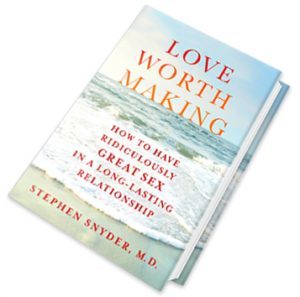
.
Be sure to check out Dr Snyder’s book, Love Worth Making – available at any of the online booksellers below, and wherever books are sold.
[image error] [image error] [image error] [image error] [image error] .
The post Sexual Health for Young Adults appeared first on Stephen Snyder MD.
Sexual Health 101: A New Online Resource for Students
In the summer of 2015, I was honored to be asked to contribute to a new interactive online resource for young adults, Student Sexual Health 101.
As an office practitioner who spends most of his time counseling individuals and couples, I appreciated the chance to bring the knowledge I’ve gained over the past 25+ years about sexual health and sexual feelings to a wider audience online. Especially since the target audience of Student Sexual Health 101 are young people just getting started learning about their sexuality.
I was pleased to have this opportunity to help young adults make some of their first and most important decisions — such as when to start being sexual with a partner. And especially happy to join my distinguished sexual health colleagues Dr Marty Klein (author of Sexual Intelligence and many other books) and Dr Aline Zolbrod (author of Sex Smart and Sex Talk) who also contributed content for this project.
Here are the initial questions and answers with the writers and editors of Student Sexual Health 101 that eventually led to my part of the site’s content:
SH101: What ARE the essential questions to consider when you are deciding whether to be intimate?
.
SNYDER: First off, you don’t just want to have physical intimacy. You want to have GOOD physical intimacy.
How to tell when it’s good? The concept is simple: It’s good if it makes you feel good about yourself.
Sounds pretty basic, huh?
Well it would be, if sexual feelings were simple. But they’re usually not.
Sex can produce many confusing feelings:
Feeling turned on (good).
Feeling grown up (good).
Feeling you’ve left childhood behind forever (mixed).
Knowing it has to be very private (mixed).
Feeling guilty over having to hide some of the details from your family (bad).
Fear of pregnancy or disease (bad).
The emotions of sex can get very confusing very fast.
My advice: Think about the physically intimate things you’ve already done together with your partner so far–
Have they left you feeling good about yourself?
If so, then you may be ready to go further.
But take it bit by bit, and at each step keep asking yourself, “Is this making me feel good or not?”
Remember, there’s no hurry. Sex should never be hurried. You have your whole life to be physically intimate.
If there are too many bad feelings, then don’t rush it. Instead, you may want to tell your partner, “I’m not ready for that yet.”
.
SH101: High school is often a confusing time when it’s often hard to know what we want for ourselves. How can teens figure out their desires, wants, and needs about physical intimacy?
.
SNYDER: People have physical intimacy for a wide variety of reasons — and often for more than one reason.
You’ll never be able to consider all the reasons in enough detail to make a decision.
Instead, it’s usually best to rely on your feelings. Pay close attention to how the physical intimacy you’ve had so far is making you feel.
Some high school students (particularly women) dissociate during sex: They don’t really feel anything emotionally at all.
It’s as if their body is present, but their feelings are absent.
If this is happening to you, then you may want to stop having sex until you’re ready to be 100% there.
Like any other intoxicating substance, sexual excitement can impair your judgment.
Most people when they’re turned on tend to lose a few IQ points.
So it’s best to consider your feelings before you make decisions about physical intimacy.
That way, you’re taking charge of your own sexual health.
.
SH101: Some students have grown up in circumstances where they experienced emotional abuse, alcoholism, mental illness, physical or sexual abuse. What should a student do if they have these family issues and want to be intimate?
.
SNYDER: Sometimes a young person’s ’emotional foundation’ may not yet be as strong as it needs to be for physical intimacy — due to past experiences of abuse, neglect, or other issues. Sometimes your mind or body may give you a sign that something isn’t quite right, and that you may not yet be ready. Some of the more common ‘signs’ include depression, feeling physically unwell, trouble sleeping or concentrating, anxiety attacks, or “dissociation” – feeling numb or that you’re not completely present.
If this happens, or if you just have a gut feeling that you’re not ready, then sometimes the most self-respecting thing to do is to tell your partner, “I’m very attracted to you, but I’m just not emotionally ready yet to be physical with you.” That takes courage to say. People tend to admire courage, so your partner’s reaction might be more positive than you expected.
.
SH101: Is there something more a young person can do to determine whether or not they are doing it for the right reasons and not just because they are looking for comfort or acceptance?
.
SNYDER: If you’re just doing it for comfort or acceptance, then usually it will give you a kind of icky feeling that says “I don’t really feel like me when I’m doing this.” What you want instead is a feeling of “yes, this is me. I feel good here with my partner. This is making me feel good about myself.”
.
SH101: When students feel pressure from peers to be intimate with someone, what are some ways to deal with the pressure?
.
SNYDER: Tell them, “I’m very attracted to him, and I feel he loves me, but we’re just taking our time. It feels really good to just follow our own feelings, rather than just do what everyone else is doing.”
 .
.© Stephen Snyder MD 2015 New York City
www.sexualityresource.com
The post Sexual Health 101: A New Online Resource for Students appeared first on Stephen Snyder MD.
October 16, 2015
Addyi (Flibanserin): 25 Things You Need to Know
October 16, 2015
Getting the Facts Right
Flibanserin—the long-awaited “pink pill” for women with Hypoactive Sexual Desire Disorder (HSDD)—was finally approved by the FDA last August, after years of debate. But so far the only women who’ve actually been able to try it have been subjects in clinical research trials. No woman has yet to be able to get a prescription for it from her doctor.
.
That’s going to change at the end of this week. Starting October 17, a woman will actually be able to take a prescription for flibanserin (which is marketed by Sprout Pharmaceuticals under the trade name Addyi) to her pharmacy.
.
What’s the best way for a woman to know whether flibanserin/Addyi would be safe and effective for her? Good question. There’s a lot of misleading information out there. (More on that in future blog posts).
.
Your best move is usually to ask your doctor. But there aren’t many doctors yet who know much about this new medication.
.
So I’ve prepared this list to get you started: 25 things a woman should know before considering taking Addyi.
1. What is Addyi/flibanserin, and why is it such a big deal?
Addyi is the trade name for flibanserin, a new non-hormonal prescription medication for hypoactive sexual desire disorder (HSDD) in women. Addyi/flibanserin is the first medicine ever specifically approved to treat loss of sexual desire in either men or women.
It’s also potentially important for sexual science — since FDA approval of flibanserin is likely to lead to much more research on the neurochemistry of desire.
2. Does Addyi really work?
Flibanserin doesn’t work for everybody. But 46-60% of women with HSDD, or a little more than half, reported clear benefit from flibanserin in randomized placebo-control clinical trials.
3. How does Addyi work?
No one knows for sure what the mechanism is. But serotonin in the brain inhibits sexual function, and flibanserin reduces brain serotonin activity — which may account for its effectiveness in restoring desire. Flibanserin also has indirect effects on dopamine and norepinephrine, which may be relevant as well.
4. Is Addyi a hormone?
No. Flibanserin doesn’t contain estrogen or testosterone or any other hormone. Addyi is a psychotropic medication. It acts specifically on serotonergic neurons in the brain, and has indirect effects on dopamine and norepinephrine.
Serotonin in the brain is generally thought to put the brakes on sex. Flibanserin may help ease up on the serotonin braking system, so libido can get going again.
5. Is Addyi safe?
The clinical trials data presented to the FDA on flibanserin included results from over 11,000 patients — one of the largest data-sets ever presented in the FDA’s history. The safety of this medication has been evaluated more stringently than that of most new drugs approved by the FDA.
That being said, there is still much that is unknown about flibanserin — as with any other recently-approved medication. Rare but serious side effects are sometimes only discovered after a drug has been in general use for months or years. So expect your prescriber to monitor your treatment carefully.
6. What about side effects?
The two side effects that the FDA looked at most carefully before approving flibanserin were (1) sedation, and (2) dizziness or fainting due to a drop in blood pressure.
Sedation was common in the clinical trials, and was usually mild. The FDA specifically asked for information on women’s ability to drive the next day after taking it. No evidence of driving impairment was detected. In fact, driving performance seemed to be better in people who’d taken flibanserin than in people who hadn’t taken it.
Dizziness, or fainting due to a drop in blood pressure, were less common. But serious drops in blood pressure were noted in many subjects in so-called “challenge studies” — where volunteers took flibanserin together with medications known to increase blood levels of the drug, or took the drug and then consumed the equivalent of 2-4 shots of liquor.
Of note, most of the subjects in the alcohol challenge studies were men. Apparently it was not easy to find female volunteers willing to take this medication together with 2-4 shots of liquor in the morning.
The results of these challenge studies led the FDA to mandate a “black-box warning” requiring patients to avoid using alcohol while taking flibanserin — and to avoid this medication while taking moderate to strong Cytochrome p450 inhibitors such as fluconazole (Diflucan and others) which can increase flibanserin blood levels.
7. What women are most likely to benefit from Addyi?
We don’t know. The clinical studies on flibanserin were done with women who had what we call “generalized, acquired HSDD.” All of these women were in long-term, stable monogamous relationships. They’d had sexual desire in the past, and were distressed at having lost it and wanted it back. The average length of time women in the study had suffered with HSDD was five years. These women reported feeling no desire for their partner, or for anyone else.
For women who fit this profile, clinical trials data would predict a 46-60% chance of a meaningful response to flibanserin. For other patterns of symptoms (such as lifelong absence of desire, or desire for other people but not their primary partner), we don’t know how effective Addyi might be.
8. Is “Hypoactive Sexual Desire Disorder” (HSDD) a real condition?
There’s no laboratory test to confirm a diagnosis of HSDD. But that’s typical for conditions that involve the brain and mind.
Diagnosis of such mental disorders usually relies on pattern recognition. Asking, “Do this patient’s symptoms fit any established patterns that research has shown respond to specific treatments?”
In diagnosing HSDD, a clinician needs to ask, “Did this woman once have sexual desire? Does she seem to have lost it permanently? Is she distressed about it? And have we ruled out all of the common things that can cause loss of desire — such as prescription medications or general unhappiness in the relationship?” If she meets this pattern, then it’s likely she has HSDD.
9. Why is HSDD such a big deal?
It’s not just the loss of desire. It’s the impact of vanished libido on a woman’s sense of self, and on her relationships.
Many women with HSDD fake excitement during sex, going through the motions while waiting for it to be over. Some women avoid being affectionate with their partners, for fear their partner will want sex. These kinds of behaviors can further diminish desire, and before long can cause serious problems in a relationship.
In surveys, the majority of women with HSDD report that their loss of desire had negatively affected their self-confidence, their body image, and their feeling of connection with their partners. It’s not uncommon for HSDD to destroy a marriage.
10. How long does Addyi take to work?
The clinical trials data suggest that flibanserin can take up to four weeks to see results, and up to eight or twelve weeks to see maximum results.
11. How long should I take Addyi before deciding it’s not effective?
Based on the data in the clinical trials, if you haven’t seen any effect on sexual desire after taking Addyi for 12 weeks, then you’re probably not a responder.
12. What if I feel desire for someone else, but not for my committed partner? Will Addyi help increase my desire for my partner?
If you’re able to feel desire for someone outside your primary relationship, then you probably don’t have HSDD as strictly defined in the flibanserin clinical trials.
Does that mean that Addyi won’t help you? We don’t know. The studies were all done on women with generalized loss of sexual desire.
13. Will Addyi make me hyper-sexual?
No, the data seem to indicate that flibanserin doesn’t cause hypersexuality. It didn’t make the women in the clinical trials want sex all the time.
Addyi is not an aphrodisiac. It’s not like eating oysters. Which, by the way, probably doesn’t do much anyhow — unless you’re already in the mood.
14. Will Addyi interfere with my ability to say “no” to sex?
Absolutely not. Since flibanserin tends to restore a woman’s natural desire, women on Addyi will probably find they have the same degree of good judgment as they had before they lost their libido.
Women with HSDD typically report that they can’t shut off the “thinking and planning” parts of their minds enough to concentrate on sex. What flibanserin seems to do is to help a woman with HSDD to say “no” to all the other things she might be worrying about — so she can think about sex again.
15. Will Addyi eliminate the need for sex therapy?
I’m pretty sure Addyi won’t put sex therapists out of business. Sex is multifactorial. There are biological and psychosocial inputs. So restoring a woman’s biological desire is only part of the picture.
I think one of the most exciting things is going to be collaboration between sex therapy and sexual medicine. That’s what’s going to lead to the most number of people getting the most effective help.
16. What if I don’t feel any effect from Addyi?
If a woman takes Addyi for 8 to 12 weeks as directed, and doesn’t notice any difference in her libido, then it’s likely she’s a non-responder. Almost half of women in clinical trials didn’t report much response to flibanserin.
For women who don’t respond to Addyi, there are off-label prescription treatments such as bupropion (Wellbutrin and others) and very low dose testosterone gel. But since they’re off-label, they require a careful discussion with your doctor. You may specifically want to consult with a sexual medicine specialist.
As a sex therapist who’s also an MD, I’ve seen many female patients report restored libido on bupropion. But the majority were at least somewhat depressed, so it’s difficult to know exactly that the therapeutic mechanism was.
17. If Addyi works for me, how long will I need to take it before I can stop it?
The short answer is that a woman can stop Addyi anytime she wants. But what women really want to know of course is whether their libido, once it’s been restored, will stay restored after they go off the medicine.
That’s an unanswered question. The technical term for it in sex therapy is “bridging” to unassisted sex. No one has yet studied how many women are going to be able eventually to “bridge” to not needing flibanserin, versus how many are going to keep needing it.
The maximum time flibanserin has been studied in premenopausal women is 18 months, and it appears to keep working over that timespan without losing its effectiveness. But more research is going to be necessary before we can say how enduring the effects might be after stopping the drug.
18. Will Addyi make me gain weight?
This question was looked at specifically in the clinical trials. Overall, patients did not gain weight on flibanserin. In fact, there was some tendency to weight loss.
19. Are there any natural alternatives to Addyi that are worth considering?
It’s a challenge to prove that any one treatment for desire is better than placebo. Flibanserin beat placebo on all self-report measures of desire, satisfaction, and distress in randomized controlled trials. That’s an impressive result.
Most herbs and supplements that claim to increase desire contain combinations of several agents. It’s very difficult scientifically to prove that even one agent makes a difference for desire. When you combine several different agents, you’re basically admitting it’s more hope than science.
20. Are there are any women who should NOT take Addyi?
There are some important medical contraindications. For instance, a woman taking Addyi should avoid using alcohol, and should avoid certain medications such as fluconazole (Diflucan and others) that can increase blood levels of flibanserin.
In my opinion, there are psychological contraindications as well. For instance, the situation where a woman’s motivation to take medication comes from her partner, rather than from the woman herself.
Addyi is serious medicine. Don’t try it just because your partner wants you to. A woman should only take Addyi if she herself wants to feel sexual again. It should be entirely her own choice.
21. Will Addyi help women who’ve lost desire after taking serotonin reuptake inhibitors such as Prozac?
This will most likely be an active area of research. Loss of libido on SRI antidepressants is a big problem in psychiatry. Especially because there are many women with panic disorder, OCD, or serious depression for whom nothing else works.
A lot of people are going to be curious about whether flibanserin can help women on SRI’s, and we’ll look forward to seeing the results when this research is done.
22. Will Addyi work for older women and post-menopausal women?
Older women suffer from HSDD as well as younger ones. Flibanserin has been studied in post-menopausal women with HSDD, and it appears to be effective. But for now its use in post-menopausal women is off-label.
23. Can I take Addyi if I’m on birth control pills?
Use of Addyi together with birth control pills can be associated with higher levels of flibanserin, and therefore greater risk of side effects.
Note: In some cases, birth control pills can be a factor in a woman’s loss of libido. My own approach is to recommend that a woman first switch to some other kind of contraception. In some cases this can improve desire, though there can be a delay of many months to over a year before desire returns.
24. What’s more effective — Addyi or sex therapy?
That depends on a lot of factors, including what caused a woman’s loss of desire. Sometimes the causes seem to be mostly situational (such as chronic unexpressed anger in a relationship). Flibanserin is probably not going to be helpful in a situation like that.
But some women in perfectly happy relationships experience a serious loss of desire following a life event such as the birth of a child, and desire never returns. In that kind of situation, a biological treatment such as flibanserin may make more sense.
Most women will want to try psychological counseling first before medication. That’s reasonable. But very often counseling doesn’t bring back desire. If you ask sex therapists, most of them will tell you that loss of desire can be the most difficult problem to treat.
Most sex therapists appreciate anything that adds to their toolbox of things that can help restore desire. Ultimately the best treatments for HSDD and related conditions may involve collaboration between sexual medicine and mental health providers. Very often the best treatment may not be “either/or,” but both.
25. How can I know whether or not I’m a good candidate for Addyi?
There’s a pocketcard online that can give you a preliminary idea of whether you fit the criteria for HSDD, which at this time is the only condition for which Addyi is indicated: http://www.obgynalliance.com/files/fsd/DSDS_Pocketcard.pdf
Then you’ll need to see a doctor who’s knowledgeable about Addyi — someone who can take the time to review your situation thoroughly to decide whether a medication makes sense.
None of us will know for sure how useful this new medication is, until we’ve had patients try it. But it’s a fresh approach to loss of sexual desire, which can be a particularly difficult problem for couples.
There will no doubt be much more clinical research on flibanserin in the years ahead — and I look forward to discussing the results with you when they become available.
Stay tuned . . .
© 2015 Stephen Snyder MD
www.SexualityResource.com
New York City
Dr Snyder received travel funding from Sprout Pharmaceuticals in August, but otherwise has no financial stake in or professional relationship with Sprout Pharmaceuticals. He has not received financial compensation from any other entity mentioned in this article or in any of the embedded links.
The opinions expressed in this article are solely Dr Snyder’s. They specifically do not imply any endorsement by the Icahn School of Medicine at Mt Sinai.
The post Addyi (Flibanserin): 25 Things You Need to Know appeared first on Stephen Snyder MD.
March 10, 2015
Pink Viagra: 7 Things the New York Times Got Wrong
As a sex therapist who also happens to be a medical doctor, I’m used to disagreeing with a lot of what I read about sexual pharmacology.
But the recent New York Times opinion piece “Nothing Is Wrong With Your Sex Drive”, regarding Sprout Pharmaceuticals’ new FDA application for flibanserin (so-called “Pink Viagra”), seemed especially in need of a systematic rebuttal.
For those of you who haven’t read the article, I encourage you to go take a look at it here. I counted 7 major errors. Here they are, in the order they appear in the text itself:
ERROR #1: Misrepresenting recent changes in psychiatric diagnosis.
NYTimes: Quoting from the Times article: “Flibanserin purportedly treats a condition called hypoactive sexual desire disorder in women. But H.S.D.D. was removed from the American Psychiatric Association’s Diagnostic and Statistical Manual of Mental Disorders in 2013, and replaced with a new diagnosis called female sexual interest/arousal disorder, or F.S.I.A.D. Why the change? Researchers have begun to understand that sexual response is not the linear mechanism they once thought it was.”
Let’s clear this up: DSM-5 replaced both HSDD and Female Sexual Arousal Disorder with one new entity, FSIAD, since there wasn’t sufficient evidence that women’s desire and arousal problems are in fact distinct. Yes, the new FSIAD diagnosis did for the first time mention responsive desire (item #3). But that was only one of several changes. See my articles, “Sex in the DSM” and “the FDA Wants to Hear More About Women and Sex” for more info on this.
ERROR #2: Confusing “can be effective” with “is generally effective.”
NYTimes: Again, quoting from the article: “The new diagnosis is intended for women who lack both spontaneous and responsive desire, and are distressed by this. For these women, research has found that nonpharmaceutical treatments like sex therapy can be effective.”
Response: Ah, that phrase: “can be.” Anything can be effective. But how often? And what about when it’s not? Yes, sex therapy can be effective. But it can also be quite useless at times. That’s why there’s been a search for biological treatments.
ERROR #3: Assuming that one subset of women with low desire is representative of all or most women with low desire.
NYTimes: Quoting again: “I can’t count the number of women I’ve talked with who assume that because their desire is responsive, rather than spontaneous, they have ‘low desire’; that their ability to enjoy sex with their partner is meaningless if they don’t also feel a persistent urge for it; in short, that they are broken, because their desire isn’t what it’s ‘supposed’ to be.”
Response: Yes, some women are helped by learning that their desire is just responsive rather than spontaneous, and that this is normal. But there are many women who lack both spontaneous and responsive desire, and are distressed about it.
ERROR #4: Either/or thinking.
NYTimes: The author writes, “What these women need is not medical treatment, but a thoughtful exploration of what creates desire between them and their partners.”
Response: Yes, women who have responsive desire but not spontaneous desire can benefit from this kind of thoughtful exploration. But how about women who lack both responsive and spontaneous desire? If experience with other conditions in sexual medicine is any guide, some of them might conceivably benefit from both medical treatment and psychological counseling.
For more on the perils of either/or thinking in sexual science, see my article, “Sex for Pleasure, for Profit, or Both?”
ERROR #5: Implying that a pill to help women regain sexual desire is similar to barbaric gay-conversion therapies.
NYTimes: “Apparently we still haven’t learned our lesson about what happens when we pathologize normal sexual functioning. In one extreme example, medical professionals once took seriously the idea that homosexuality was a disease in need of a cure . . .”
The author goes on to describe a Frankenstein-like case published in 1972 of a gay patient with epilepsy who had neurosurgery to implant electrodes in his pleasure centers, after which his doctors tried to recondition him to enjoy heterosexual erotica.
Response: Is this really supposed to be equivalent to a woman who’s distressed by a lack of sexual desire and wants to try a pill? I think that’s kind of a stretch. There’s a big difference between trying to change someone’s essential sexual nature, and simply helping them recover a part of their nature that they’ve lost.
ERROR #6: Mislabeling sexual psychopharmacology as “outdated science.”
NYTimes: Again, I quote: “Outdated science isn’t going to improve our sex lives. But embracing our differences — working with our sexuality, rather than against it — will.”
Response: Science means being honest about what you don’t know, and being willing to correct yourself when you’re wrong. It’s hardly scientific to claim, “We know what’s good for all women, and what’s not.”
I don’t think it’s fair to characterize pharmacologically-driven sex research as “outdated.” It’s crude now, but it gets more sophisticated all the time. Desire is complicated, and it’s affected by an extraordinary number of things. No biological researcher would deny that. But complexity doesn’t mean that medical treatments for desire problems are of necessity invalid. (See item #4 – “either/or” thinking).
ERROR #7: Intolerance of diversity.
NYTimes: The article (quoted above, item 6) ends by exhorting us to start “embracing our differences.”
Response: I’d like to see the anti-medicalization folks take this message seriously. Yes, let’s embrace our differences. Let’s acknowledge that many women might reject out of hand the idea of taking a pill for desire, but that some others might want to give it a try.
Why not allow for differences, and let each woman use her own judgment?
If the FDA approves flibanserin for women, then we’ll find out whether it works in the real world—and for whom.
Until then, let’s not pretend we know more than we do about the causes and best treatments for lost sexual desire. We still have much to learn.
© Stephen Snyder MD 2015
Related articles on Pink Viagra:
 PsychologyToday: The FDA Wants to Hear More About Women and Sex
PsychologyToday: The FDA Wants to Hear More About Women and Sex
Sex therapist colleagues who were involved in the flibanserin (Pink Viagra) trials tell me they saw results—satisfied women, and happier couples. Were these placebo responders? Maybe. But something tells me that Boehringer Ingelheim and Sprout Pharmaceuticals wouldn’t have bet so big on flibanserin unless they were pretty sure it did something real. Measuring such an effect, on the other hand, is a huge problem.
 Pink Viagra and the Riddle of Female Sexual Desire
Pink Viagra and the Riddle of Female Sexual Desire
We sex therapists all have clients whom our best current methods haven’t helped, so we always need better treatments. In 2010 when Boehringer Ingelheim’s application for flibanserin was rejected, some had claimed that HSDD was not a real disorder – that it was created by pharma in order to make money. But the FDA disagreed. They indicated an understanding that HSDD was real, but that B-I hadn’t proved their drug worked for it.
 Simplicity, Complexity, and the Hunt for Pink Viagra
Simplicity, Complexity, and the Hunt for Pink Viagra
The term “Pink Viagra” makes little sense really. Viagra treats erections, whereas flibanserin aims to treat libido. Viagra works on the body and flibanserin on the brain. It’s also likely that flibanserin, if it’s ever approved, won’t have the same dramatic impact on female libido as Viagra has on erectile rigidity. So why the analogy? I think behind the idea of “Viagra for women” is a wish that women’s sexual processes would simply be less complicated.
 PsychologyToday: Pink Viagra – Sex for Pleasure, for Profit, or Both
PsychologyToday: Pink Viagra – Sex for Pleasure, for Profit, or Both
Most women’s sexual problems are more due to environmental factors such as fatigue or relationship issues than anything biological. But “most” is not “all.” Many women in loving, balanced relationships with perfectly attentive mates find at some point that they’ve lost all interest in sex. I find it hard to believe this phenomenon is completely environmental.
The post Pink Viagra: 7 Things the New York Times Got Wrong appeared first on Stephen Snyder MD.
May 4, 2014
Can You Trust LinkedUp!, The New Dating App for Business?
As a sex therapist I spend a lot of time counseling single New Yorkers about how to find good partners. That’s gotten a lot easier since online dating has radically increased the number of people to choose from. But online dating has its disadvantages.
It’s great if you’re just looking for a hookup or casual fling. You know no one in common, so you don’t have to worry about hurting your reputation if things don’t work out. You go your separate ways afterwards, and there’s no collateral damage to either of your social networks.
It’s also great if like many people in sex therapy you’re worried about your sexual performance. If the sex is a disappointment, no one else will find out.
But if you’re looking for a more serious relationship, the disconnect between your social networks becomes a disadvantage. Since you know no one in common, you lack a context for your relationship. There’s no social “glue” to hold you together.
Relationships are the fruit of community. Community is the tree that grows the fruit.
Online dating delivers the fruit without the tree.
Trust is a hard thing in any relationship. But it’s harder to trust someone if you don’t really know or understand the world they come from. The subtle signals that people in the same community give each other are often lost or misperceived by a stranger.
What would really be valuable is an online dating platform that taps into a community of people you know and trust.
The new app, LinkedUp! does just that by using your professional business network on LinkedIn. Using API key technology (the same technology you use for example to share photos from Flickr to your Facebook), LinkedUp! mines your LinkedIn network for other LinkedUp! users and offers them for your consideration. But can you trust LinkedUp! to deliver a relationship?
At first glance, this might seem a dubious idea. Aren’t we supposed to avoid mixing business and pleasure that way? Aren’t we warned against office romances?
I suggest we turn that idea on its head: The reason those warnings are necessary is that ordinarily the people we meet during the workday are exactly the people we’d like to date. We know people in common, and we have similar struggles. So we have lots to talk about. We share the tree of community, so there’s some foundation of trust.
When people have similar experiences and common interests, deep feelings can develop. That’s why people tend to fall in love with their co-workers. Today when most of the people I know in Manhattan work at least 12 hour days, the person who most understands you is likely to be someone in your office. That person is also way more likely to share your interests and values than someone from a radically different walk of life.
In the 21st Century, when for most people traditional sources of community like neighborhoods and religious groups have faded away, our work worlds may be all that’s left from which to build the tree of community so essential for relationships to flourish.
As a sex therapist, I’m glad there are now options. For someone looking for a fling or to build their sexual confidence, I’ll still suggest Tinder or OKCupid. But for someone looking for lasting love, I’m starting to wonder whether LinkedUp! might be appropriate, and if we can trust it to create what we want.
There are certainly risks to merging business and personal, so LinkedUp! won’t be for everyone. Power relationships in business change over time; someone who seems safe to date now may someday become your boss. But those kinds of risks are inherent in any group activity.
I’ll be interested to see if LinkedUp! lives up to its promise — making the business world into a tree of community that grows the fruit of loving relationships.
I’ll let you know.
© Stephen Snyder, MD 2014
www.sexualityresource.com
New York City
Photo credit: Pedrosimoes7, via Creative Commons
The post Can You Trust LinkedUp!, The New Dating App for Business? appeared first on Stephen Snyder MD.
April 23, 2014
How to Talk Sex – and Why
“Going Oral” Has Surprising Results
In her new book An Intimate Life, sex surrogate Cheryl Cohen Greene (the one portrayed by Helen Hunt in The Sessions) describes her work with a man who has been unable to get an erection with his wife. After much exploration, it is discovered that the source of his problem is a very simple one:
During oral sex, his wife hurts him with her teeth. But he’s been too worried about hurting her feelings to tell her.
The title of the chapter, “Going Oral,” refers to the difficult matter of finding the words to tell your wife what the problem is. Getting naked with a relative stranger turns out to be the easy part.
Figuring out how to talk sex with your life companion can be much harder.
As a sex therapist I talk sex all day. I sometimes forget how shocking it can be for people simply to talk about sex.
Learning to Talk Sex in Bed
The same goes for talking during sex. There appears to be an unwritten code of silence in bed. Of course there are times when it’s best not to talk — when it might disrupt an especially passionate moment. But there are also plenty of times when speaking in bed can be perfectly natural once one acquires the knack.
As a sex therapist, when I suggest to a couple that they “go oral” and begin talking during sex, they often look at me as if I’m from a strange planet. Most couples, having lived their entire erotic lives under the influence of the code of silence, are at first resistant to the idea, thinking it unromantic.
But I usually persist, and the results are very often positive. Sometimes it’s only after “going oral” that people become aware how much lovemaking was wasted doing things they didn’t really enjoy very much.
The College Rule Made Hookups More Fun
Legend has it that after a particular date-rape scandal on campus, a leading undergraduate college instituted a novel set of rules: If an undergraduate wanted to put any moves on a fellow student, he was required first to tell her exactly what he wanted to do. He’d only be allowed to proceed if the other student gave verbal consent.
It was expected that these new rules would pretty much kill romance on campus. But according to legend the results were often positive. Hookups were described as being more fun once it became permissible to talk sex.
Eros thrives when boundaries are crossed. People appreciate the daring it takes to cross the boundary of speech.
Breaking the erotic code of silence can require courage. But isn’t that true of most things that really matter?
© Stephen Snyder, MD 2014
www.sexualityresource.com
New York City
See also:
SexualityResource Interviews sex surrogate Cheryl Cohen Greene
The Healing Power of Erotic Love
Sex Therapist at the Academy Awards — Helen Hunt in The Sessions
Sex Therapist at the Academy Awards, Part 2 – The Courage to be Seen
The post How to Talk Sex – and Why appeared first on Stephen Snyder MD.














